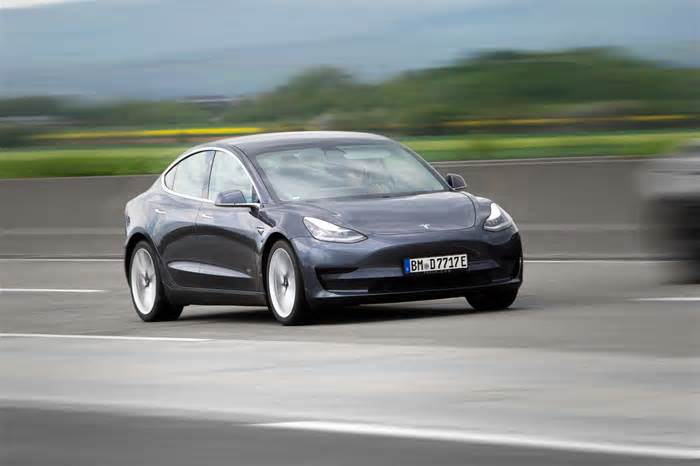
In Zimbabwe, Starlink's fast internet gives telehealth a boost
- by telecom.economictimes.indiatimes
- Nov 27, 2024
- 0 Comments
- 0 Likes Flag 0 Of 5

Updated On Nov 27, 2024 at 08:08 AM IST
FILE PHOTO: A SpaceX Falcon 9 rocket is launched, carrying 23 Starlink satellites into low Earth orbit in Cape Canaveral, Florida, U.S. May 6, 2024. REUTERS/Joe Skipper/File Photo
By Farai Shawn Matiashe
NHEDZIWA, Zimbabwe: In early November, Precious Chinonzura went to a telehealth, or e-health, booth in the local shopping centre in her village in Zimbabwe to see if she could get relief from bladder pains that had been bothering her for a month.
The 30-year-old consulted a doctor online and by evening the medication he prescribed had been delivered to her village of Nhedziwa from a telehealth booth in Chakohwa, some 22 km (14 miles) away.
Advt
"The doctor told me I had a bladder infection and needed treatment. I had privacy and I spoke freely to the doctor," Chinonzura, who runs a small business at the shopping centre, told the Thomson Reuters Foundation.
Telehealth - the use of technology to provide and access healthcare services remotely - has been growing around the world but is relatively new in Zimbabwe, where internet services are generally slow, unreliable and among Africa's most expensive.
This could change after Elon Musk's Starlink, the satellite unit of SpaceX, received the telecom regulator's green light in May to operate its internet services in the country.
Starlink first launched in Africa last year as satellite-internet becomes an increasingly popular connectivity solution in the continent, but it has faced teething problems -- from complaints about speed to regulatory challenges.
ZimSmart Villages, which has been setting up telehealth services in Zimbabwe since February, has already connected two of its 16 e-health centres to Starlink and plans to connect five more by the end of November, said ZimSmart Villages co-founder and chief operations officer Tawanda Njerere.
There is no countrywide data on how many companies offer telehealth services in Zimbabwe.
Advt
Njerere said Starlink enabled ZimSmart Villages to allow access to its online health platform BatsiHealth, especially in underserved regions where connectivity can be a problem.
"Starlink provides the fast, low-latency connectivity that virtual consultations need for real-time telepresence on BatsiHealth," he said, adding it is cost-effective.
"Our doctors can conduct video consultations with near in-person clarity, seeing fine visual details essential for accurate diagnoses."
Zimbabwe's health sector has been deteriorating for years as the ailing economy has been hit by chronic corruption, mismanagement, economic sanctions, and southern Africa's worst drought in decades.
There are shortages of basic drugs like paracetamol, public hospitals are struggling and there is a lack of doctors and nurses, forcing people to turn to private health facilities.
As of 2022, Zimbabwe had 1.7 doctors per 10,000 people, according to the World Health Organization (WHO), compared to Africa's average of 2.6 per 10,000 people.
STARLINK KIT TOO COSTLY FOR MOST
After first launching in Nigeria last year, Starlink is now operating in 15 countries in the continent, with Chad becoming the latest to approve the technology.
Starlink's expansion across Africa has not been without problems -- from complaints about cost and speed to regulatory challenges and resistance from local mobile operators.
Admire Mare, head of the communication and media studies department at the University of Johannesburg, said Starlink kits were too expensive despite its services being more reliable and faster than those of local providers.
Starlink's basic internet package consists of an $170 kit and $30 monthly subscription, while at the high-end, the kit costs $350 and the subscription $50 a month. That is very costly for many in a country like Zimbabwe where a teacher, for example, earns about $350 a month.
By comparison, local provider Liquid Intelligent Technologies sells an equivalent high-end kit for $225, while its monthly subscription costs about $173.
Mare said there was a risk that the high cost of innovation would reproduce existing inequalities, since only the wealthy would be able to afford the cost of the Starlink kit and therefore be able to benefit from the cheaper internet services it provides compared to local operators.
"The rest of us are unfortunately going to remain locked up in using expensive broadband internet," he said.
"When we talk about making sure that we bridge the digital divide some of these technologies are often presented as saviours (but they) are not going to save us."
Some Starlink users in Zimbabwe's capital city Harare and second-largest city Bulawayo have complained about slow speeds, with some returning to their traditional providers. The kits have also sold out in these cities, meaning new users cannot sign up for now.
Starlink has also faced regulatory challenges and resistance from state monopolies in some countries.
Cameroon ordered the seizure of Starlink equipment at ports earlier this year as Starlink was not licensed to operate in the country.
In Kenya, the country's biggest telecoms firm Safaricom has urged regulators to consider requiring satellite internet providers such as Starlink to partner with local mobile network operators.
TRANSFORMING LIVES
Starlink's presence in Zimbabwe already appeared to be helping consumers by connecting remote areas that are not covered by traditional internet service and by pushing local providers to reduce prices, said Dr. Danford Zirugo, assistant professor of journalism at the University of Alabama.
In August, Zimbabwe's largest mobile operator Econet slashed prices of its SmartBiz package, which offers internet via a portable MiFi or small router, by 25%. It cut the price of its 5 megabytes per second unlimited package to $45 per month from $70.
Willard Shoko, a Starlink researcher and consultant, said Starlink's presence in Zimbabwe could revolutionise its health sector though more ground stations were needed to boost services.
"When you connect hospitals and clinics to high-speed internet, it means that doctors from anywhere in the world can collaborate. This can be the difference between a life being saved and a life being lost," he told the Thomson Reuters Foundation.
Back in Nhedziwa, Chinonzura said the benefits of telehealth centres were already proving to be immense.
If she hadn't had access to an online doctor, she would have had to close her business and travel to the city of Mutare, 83 km (51.5 miles) away, or to Harare, nearly 350 km (217 miles) away.
"I could not believe it. I did not know that it was possible," said the mother-of-two. "I will come here whenever I feel sick for consultation and check-ups."
Please first to comment
Related Post
Stay Connected
Tweets by elonmuskTo get the latest tweets please make sure you are logged in on X on this browser.
Sponsored
Popular Post
Middle-Aged Dentist Bought a Tesla Cybertruck, Now He Gets All the Attention He Wanted
32 ViewsNov 23 ,2024
Tesla: Buy This Dip, Energy Growth And Margin Recovery Are Vastly Underappreciated
28 ViewsJul 29 ,2024






 Energy
Energy



















